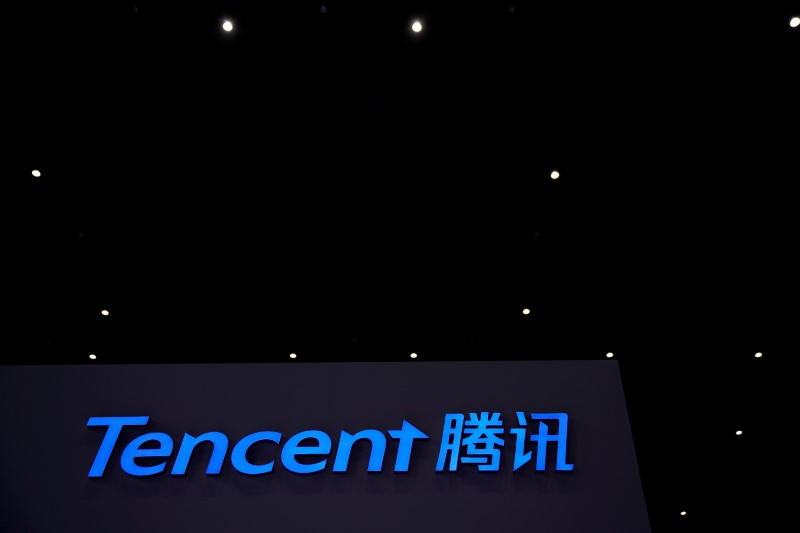
By Michael Martina, David Shepardson and Karen Freifeld
WASHINGTON/NEW YORK (Reuters) – The U.S. Defense Department said on Monday it added Chinese tech giant Tencent Holdings (OTC 🙂 and battery maker CATL to a list of companies it says work with the Chinese military , in a move that will intensify tensions in China.
Shares of Hong Kong-listed Tencent, the parent of Chinese instant messaging app WeChat, fell 7.3% on Tuesday, losing around HK$275 billion ($35.4 billion) in value. market, CATL shares listed in Shenzhen closed 2.8% lower, shedding 32.2 billion yuan (4.4 billion dollars) in market value.
Both companies called the move, which comes two weeks before US President-elect Donald Trump takes office, a “mistake.” Tencent said on Tuesday that its business would not be affected and that it would begin a reconsideration process to correct its inclusion and, if necessary, take legal action.
CATL, the world’s largest maker of electric vehicle batteries, said it is “not involved in any military-related activities.”
While the designation does not imply immediate bans, it can be a blow to the reputation of the affected companies and represents a stark warning to US entities and companies about the risks of doing business with them. It could also increase pressure on the US Treasury Department to sanction the companies.
The annually updated list of Chinese military companies, formally mandated under U.S. law as the “Section 1260H list,” designated 134 companies, according to a notice published in the Federal Register.
It also included chip maker Changxin Memory Technologies, Quectel Wireless, drone maker Autel Robotics and China’s largest shipping company COSCO Shipping Holdings, according to a document released Monday.
Also on the list are two entities owned by the Chinese state oil company China National Offshore Oil Corporation, CNOOC (NYSE 🙂 China Ltd and CNOOC International Trading.
A Quectel spokesperson said the company “does not work with the military of any country and will ask the Pentagon to reconsider its designation, which has clearly been made in error.” Quectel shares fell almost 7%.
COSCO shares listed in Hong Kong fell more than 4%. Neither it nor the other companies immediately responded to requests for comment.
The Chinese Foreign Ministry said at a daily press briefing on Tuesday that it urged the United States to immediately lift “illegal unilateral sanctions” against Chinese companies, adding that China would safeguard the legitimate rights and interests of its companies.
IMPACT ON COMPANIES
The updated list is one of numerous actions taken by Washington in recent years to highlight and restrict Chinese companies it says pose security risks, weighing on strained relations between the world’s two largest economies. .
Jefferies said in a research note that the purpose of the Chinese Military Companies (CMC) list was to express the opinion of the Department of Defense that could serve as a reference for other government departments.
“The most serious consequence for CMC companies is the ban on investments in the United States, but it all depends on Trump and his team.”
In 2021, the US Department of Defense delisted Xiaomi (OTC:) after the Chinese technology company sued the US government for listing it. A federal judge called the US government’s process for listing Xiaomi “deeply flawed.”
Ivan Su, senior equity analyst at Morningstar, said he believed Tencent had a good chance of getting delisted through US courts, like Xiaomi, but that its inclusion could cause reputational damage.
Exposure to Tencent’s U.S. earnings was in the high single-digit percentage range, he added, and was primarily made up of gaming revenue. “While this represents the maximum potential downside, we consider it highly unlikely that Tencent’s US gaming revenue will be affected in the near term.”
Craig Singleton, a China expert at the Foundation for Defense of Democracies, said the additions showed it was “reckless” for American companies to do business with a growing swath of Chinese corporations.
“The United States is no longer limited to safeguarding a handful of technologies,” he said. “The garden of sensitive technologies is growing and the fence that protects them is getting stronger.”
Other companies added include MGI Tech, which makes genomic sequencing instruments, and Origincell Technology, which lawmakers say operates a network of cell banks and biostorage technologies. Neither firm immediately responded to requests for comment.
US lawmakers had pressured the Pentagon throughout 2024 to add some of the companies, including CATL, to the list. Ford Motor (NYSE:) is building a battery plant in Michigan and plans to license CATL technology to produce low-cost lithium iron batteries at the facility, a move that has raised concerns among some lawmakers. Ford had no immediate comment Monday.
Two previously listed companies, drone maker DJI and Lidar maker Hesai Technologies, sued the Pentagon last year over their previous designations, but remain on the updated list.
The Pentagon also removed six companies that it said no longer met the requirements for the designation, including artificial intelligence firm Beijing Megvii Technology, China Railway Construction Corporation Limited, China State Construction Group Co and China Telecommunications Corporation.

($1 = 7.7730 Hong Kong dollars)
(1 dollar = 7.3250 renminbi)

